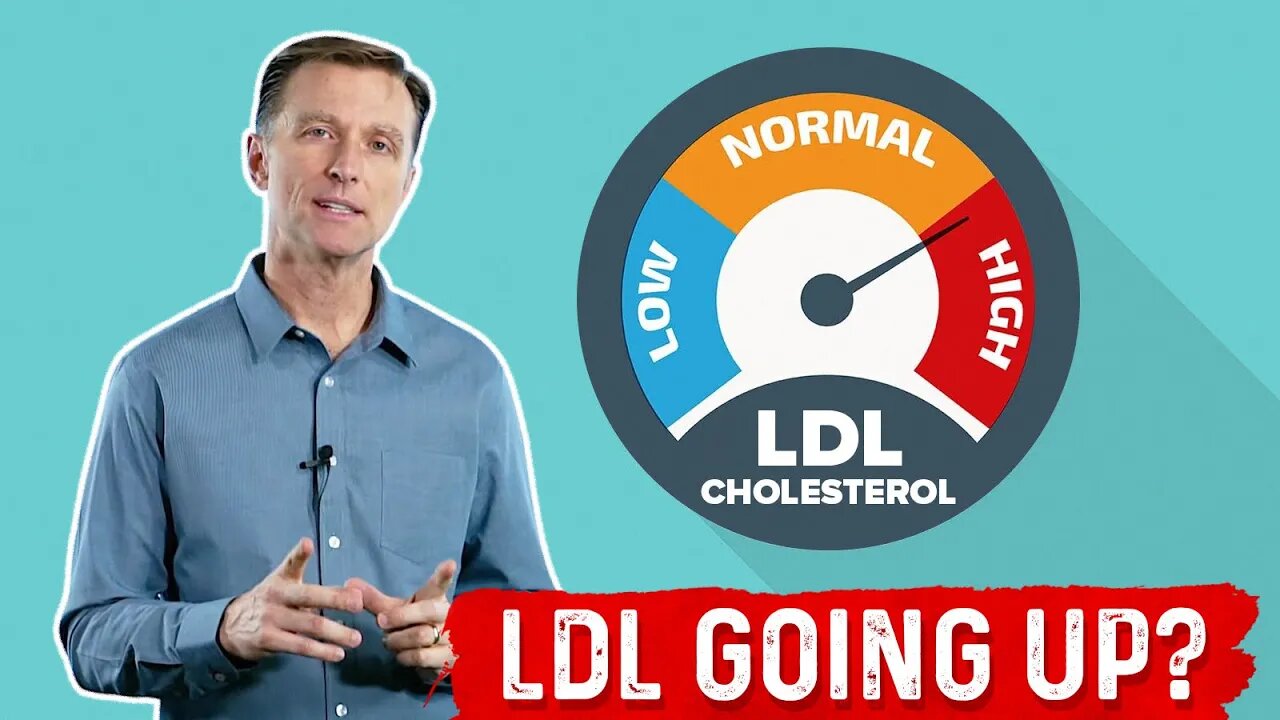Premium Only Content

Why Might LDL Cholesterol Go Up on Keto?
Why would LDL cholesterol go up on keto, isn't it supposed to go down?
Timestamps
0:08 The first thing you need to know
0:25 What is LDL?
0:40 LDL is not bad
1:20 Why LDL might go up on keto
3:20 Another reason LDL may go up on keto
3:30 What you need to know about LDL
5:30 How to lower LDL
Today we're going to talk about LDL and keto. I'm going to explain why your LDL or total cholesterol would go up when's starting the keto diet.
For most people, when starting the ketogenic diet, their LDL will go down and not up. If it does go up, it's not as common, but I don't believe it's a problem.
LDL is not cholesterol. It's low-density lipoprotein. LDL acts like a carrier boat that travels the cholesterol through the blood. LDL is not bad. LDL takes the cholesterol from the liver and puts it into the tissues. HDL takes the cholesterol from the tissues and puts it into the liver.
The body needs cholesterol for hormones and cellular membranes. Your body makes a lot of cholesterol, and you also get cholesterol from the diet. Typically, when a person consumes more fat in their diet, the body makes less cholesterol.
In an interesting study done by Stephen Phinney, he talked about how cholesterol is also stored in the fat cell in a certain amount. When you do the ketogenic plan, and you lose weight, the fat cell shrinks. In the first phases of this process, you could release triglycerides, but the body tends to hold on to the cholesterol to a certain point. This could explain why you could start the keto plan, and your cholesterol or LDL is good but then spikes later on.
Cholesterol is not used as fuel in the body. The fat cell is mostly triglycerides, which can be used as fuel. What he found in the study was that eventually, the cholesterol is released and goes into the liver, combines with bile, gets dissolved, and goes out through the intestine.
Another reason it may go up is simply that you're consuming a higher fat diet, and you have more fat circulating throughout the body.
There are two types of LDL:
Type A—is a very large type.
Type B—is a small and dense type.
Type B is the type that can potentially invade the artery walls and create inflammation and damage. Type B comes from consuming a high carbohydrate diet. Type A comes from doing a high-fat, low-carb diet. When you get on a high-fat diet and lower your carbs, you may have more type A LDL.
An advanced test (advanced lipid panel) can differentiate between the two types of LDL and give you more knowledge as to what's going on.
How to help lower LDL:
• Consume more fiber in the form of vegetables
• Reduce some of the extra fat you consume (not below 75g)
Talk to a Product Advisor to find the best product for you!
Call 1-540-299-1556 with your questions about Dr. Berg's products. Product Advisors are available Monday through Friday 8am-6pm and Saturday 9am-5pm EST.
* At this time, we no longer offer Keto Consulting and our Product Advisors will only be advising on which product is best for you and advise on how to take them.
Dr. Eric Berg DC Bio:
Dr. Berg, age 56, is a chiropractor who specializes in Healthy Ketosis & Intermittent Fasting. He is the author of the best-selling book The Healthy Keto Plan, and is the Director of Dr. Berg’s Nutritionals. He no longer practices, but focuses on health education through social media.
DR. BERG'S SHOP: https://bit.ly/3bR1IN9
Follow us on FACEBOOK: fb.me/DrEricBerg
Send a Message to his team: m.me/DrEricBerg
ABOUT DR. BERG: https://bit.ly/2LPrExY
Disclaimer:
Dr. Eric Berg received his Doctor of Chiropractic degree from Palmer College of Chiropractic in 1988. His use of “doctor” or “Dr.” in relation to himself solely refers to that degree. Dr. Berg is a licensed chiropractor in Virginia, California, and Louisiana, but he no longer practices chiropractic in any state and does not see patients so he can focus on educating people as a full time activity, yet he maintains an active license. This video is for general informational purposes only. It should not be used to self-diagnose and it is not a substitute for a medical exam, cure, treatment, diagnosis, and prescription or recommendation. It does not create a doctor-patient relationship between Dr. Berg and you. You should not make any change in your health regimen or diet before first consulting a physician and obtaining a medical exam, diagnosis, and recommendation. Always seek the advice of a physician or other qualified health provider with any questions you may have regarding a medical condition.
Thanks for watching! I hope this video helps you better understand why LDL cholesterol might go up on keto.
-
 24:58
24:58
Dr. Eric Berg
15 days agoHow to Fall Back Asleep FAST (Even at 2AM)
8.11K10 -
 LIVE
LIVE
SpartakusLIVE
52 minutes ago#1 Mountain of Muscle with HUGE Legs saves your weekend from complete BOREDOMNight HYPE
130 watching -
 LIVE
LIVE
Nerdrotic
1 hour ago $1.07 earnedDeDunking the Debunkers with Dan Richards | Forbidden Frontier #119
651 watching -
 LIVE
LIVE
EricJohnPizzaArtist
6 days agoAwesome Sauce PIZZA ART LIVE Ep. #64: Robbie “The Fire” Bernstein
70 watching -
 LIVE
LIVE
GritsGG
5 hours agoWarzone Win Grinding! Most Wins in WORLD! 3680+!
136 watching -
![[LIVE] STAR WARS: Jedi Academy - Movie Battles 2 | ReaperAF95's Community Event Day 2](https://1a-1791.com/video/fwe2/ce/s8/1/E/Q/f/o/EQfoz.0kob-small-LIVE-STAR-WARS-Jedi-Academy.jpg) LIVE
LIVE
Joke65
1 hour ago[LIVE] STAR WARS: Jedi Academy - Movie Battles 2 | ReaperAF95's Community Event Day 2
25 watching -
 5:41:09
5:41:09
Right Side Broadcasting Network
2 days agoLIVE REPLAY: President Trump to Deliver Remarks at America's Navy 250 in Norfolk, VA - 10/5/25
103K64 -
 LIVE
LIVE
SynsFPS
2 hours ago🔴B07 Beta🔴|🔴 LEVEL CAP INCREASED 🔴|🔴Path to Verify 🔴
94 watching -
 LIVE
LIVE
tminnzy
2 hours ago*BETA DROPS* BO7 LEVEL CAP INCREASE! OPEN BETA
104 watching -
 1:06:42
1:06:42
The White House
4 hours agoPresident Trump Delivers Remarks at Navy 250 Celebration
27.4K40
